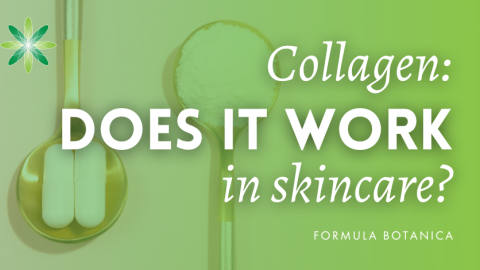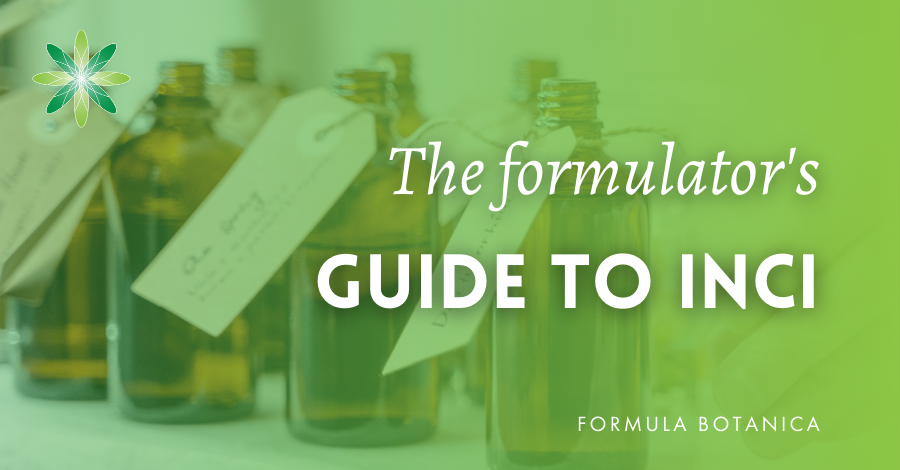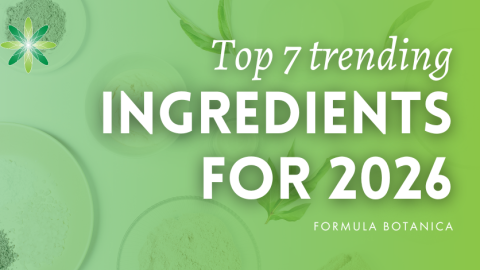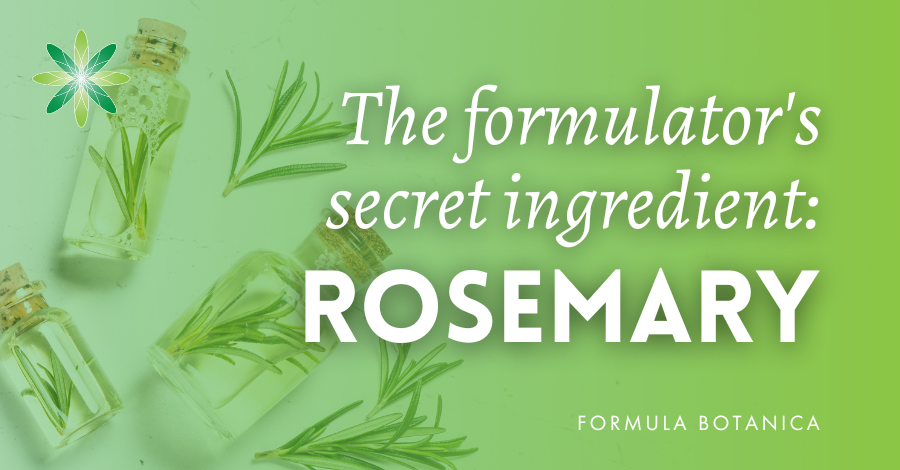Updated: 11.10.22
The benefits of vitamin C for skin have been one of the hypes in natural skincare circles, but it is not the easiest ingredient to work with. As a result, we’ve noticed a good many questions about vitamin C among our students and in our Facebook community. So, we decided it was high time to tackle vitamin C, or L-ascorbic acid.
Here, we look in particular at vitamin C’s benefits in high-performance skincare formulas. To explore which form of vitamin C is best suited to different formulations and to try out using it, see also:
First, let’s refresh our minds about vitamin C, which despite being familiar, has some surprises in store for the formulator.
Vitamin C: its nutritional background
Humans are one of the few mammals, together with monkeys and guinea pigs, that cannot synthesise vitamin C (L-ascorbic acid) on their own. It is therefore considered an essential nutrient that needs to be supplied through our diet.
Vitamin C deficiencies were very common in the past. When we look back in history, we come across scurvy, a disease caused by extreme vitamin C deficiency that was potentially fatal. Luckily, in our day and age, scurvy is rare.
Vitamin C Fact: the term “ascorbic” literally means “against scurvy” (‘a’ means “without/away from”; and “scorbic/scorbutic” means “of scurvy”).
However, varying degrees of vitamin C deficiency are still possible. Some risk factors include tobacco use, alcohol intake, low income and overall poor nutritional status. The prevalence of vitamin C deficiency varies across the world. This probably means many people suffer a vitamin C deficiency, even if they don’t realise it.
Vitamin C can be found in many fruits and vegetables. Examples of sources rich in vitamin C are: Kakadu plum, camu camu, acerola cherries, rosehips, blackcurrants, red peppers, parsley, cress and leafy greens like spinach, cabbages, Brussels sprouts, broccoli and kale; as well as cauliflower; along with tomatoes, citrus fruits, melon, pineapple, berries, kiwi fruit, and strawberries. Vitamin C comes bundled in lots of delicious foods, which we could easily make part of our daily diet.
The skin’s vitamin C content
Not only is vitamin C vital inside our body as a nutrient, but it is the most abundant antioxidant present in our skin, where it is found in:
The dermis: this is the deeper layer of our skin, below the epidermis. Here, we find fibroblasts that make collagen. This layer receives nutrients through blood vessels.
The epidermis: this is the outer and top layer of our skin. Here, we find melanocytes, which are cells responsible for making the pigment melanin in our skin. The epidermis receives nutrition only through diffusion from the dermis. Then, vitamin C is taken by keratinocytes through specific transporters.
The effect of oral supplementation of vitamin C remains controversial, as it does not seem to increase its skin levels significantly.
We’ll come back to melanin and collagen later.
Our vitamin C content in both these layers can be compromised in aged or photo-aged skin, although it is uncertain if this reflects cause or effect. Exposure to pollution and UV light is also related to depleted vitamin C content in the skin.
Vitamin C: its properties and use in high-performance formulas
Vitamin C as an antioxidant
Free radicals are highly reactive molecules with unpaired electrons. They can damage various vital molecules in the body, such as proteins, lipids and nucleic acids, such as DNA and RNA.
Their production can be increased through the skin’s exposure to pollution and smoke, but occur mostly through exposure to UV radiation. Anti-pollution skincare is a fast-growing sector of the cosmetics industry. See our post on how to make anti-pollution skincare.
They are also generated through our normal internal metabolism, especially by inflammatory processes. The internal production of free radicals increases with age, while the defence mechanisms that counter them decrease. This imbalance leads to progressive damage to cellular structures and results in accelerated ageing.
Antioxidants are substances that can provide protection against oxidative stress by scavenging these free radicals.
Vitamin C works in two different ways to counter free radicals:
Firstly, vitamin C itself is an effective free radical scavenger as it provides electrons to neutralise free radicals; and secondly, it regenerates alpha-tocopherol (vitamin E) levels, indirectly helping prevent the skin’s lipid peroxidation.
See also our: Formulator’s guide to antioxidants in cosmetics
Vitamin C as a collagen synthesis promotor
Collagen is a protein and the primary structural component of the dermis. It is responsible for strengthening and supporting our skin. As we age, these fibres deteriorate as collagen production slows and elastin, another protein, is less springy. This leads to wrinkling and other typical signs of skin ageing.
Vitamin C regulates and promotes an increase in collagen synthesis and helps stabilise the collagen molecule. So, it gives our skin a double whammy, helping it look firmer and suppler and overall healthier and younger.
Vitamin C and photo protection
First, we must stress that vitamin C cannot – repeat, cannot – be used as a sunscreen because it does not absorb light in the UVA and the UVB spectrum. You can find out more about sunscreens in formulas on these two posts:
However, vitamin C can limit the damage induced by ultraviolet light exposure. That is because its antioxidant action helps protect the skin from the free radicals produced by this UV exposure.
Topically-applied combinations of vitamin C and E are more effective in preventing photodamage than either vitamin alone.
It also aids in reducing photodamage thanks to its ability to regulate the synthesis of the structural protein collagen.
Vitamin C as a brightening agent
Melanocytes in the epidermis produce melanin. Melanin is the brown pigment that makes our skin colour and what makes our skin tan. When our skin is exposed to rays of sunshine, melanin particles gather and absorb these rays as they pass through the upper layers of the epidermis. These clusters of melanin form a protective shield over the keratinocytes’ nucleus, protecting their DNA from UV damage.
As we grow older, our skin can develop hyperpigmentation, which means that skin patches become darker compared with the normal surrounding skin. This darkening occurs when an excess of melanin forms deposits in the skin.
As formulators, it is our aim to help reduce this hyperpigmentation without causing undesirable hypopigmentation – loss of colour in the skin – and without irritation in the surrounding and normally-pigmented skin.
Melanin is produced by the enzyme tyrosinase, located in the melanocytes within the stratum basale, the bottom layer of the epidermis. Vitamin C inhibits this enzyme’s activity, supposedly by interfering in the oxidation steps necessary for it to work. Thus, it helps regulate tyrosinase activity and normalise melanin production.
As natural, organic cosmetic skincare formulators, we do not use products that have an effect below the cosmetic (i.e., epidermal) layers of the skin, nor do we use ingredients that have a bleaching effect on the epidermis.
Therefore, when choosing an ingredient to even the skin tone, it is important to check its function. We need to know whether the ingredient could be toxic for the melanocyte or whether it could interrupt the key steps of melanogenesis, which is the case of vitamin C.
Topically-applied vitamin C has the cosmetic effect of fading dark spots and brightening the skin.
Vitamin C is often combined with soy and/or liquorice for even better results on reducing the visible signs of hyperpigmentation.
On account of all these properties, we can conclude that vitamin C offers numerous benefits for the skin when applied topically. The natural formulator can use it to achieve remarkable effects in high-performance skincare.
A note about vitamin C and dry skin
The effects of vitamin C on skin dryness are still unclear. Some research suggests that vitamin C reduces transepidermal water loss (TEWL) because it promotes the synthesis of barrier lipids, which establishes a functioning stratum corneum with low water permeability, preventing water evaporation. Others mention an increased TEWL when vitamin C is applied to the skin. As these studies involve the topical application of formulations containing vitamin C, variable effects can be related to the other components of these products, such as their pH, for instance. So, it is difficult to draw conclusions at the moment but this is something to keep an eye on in the future.
Are there any benefits in vitamin C tablets for the skin?
As we saw earlier in this post, vitamin C is vital to our bodies’ overall health and well-being, skin included. Also, it is still possible for some of us to have vitamin C deficiencies in our diets even today – though we might not realise it. If you think taking vitamin C supplementation can be good for your health, consider consulting professional advice to get usage directions. However, it is relevant to note that there is no evidence that oral intake of vitamin C as a supplement can increase its skin levels significantly. This is one of the reasons why vitamin C became so popular as a cosmetic ingredient as there is greater chance of getting skin benefits from it through external use.
Can you simply crush up vitamin C tablets for skin care use? Again, as we noted before, vitamin C is an unstable ingredient, and cosmetics need to be carefully formulated for vitamin C to be effective in skincare. A vitamin C tablet contains ascorbic acid but also other components necessary for this dosage form. It is better to use cosmetic grade vitamin C or its derivatives and understand which is best suited to the kind of formulation you are making. This post in our vitamin C series is, therefore, essential reading: Best forms of vitamin C in natural skincare.
Further reading and references on vitamin C
Ravetti S et al., 2019. Ascorbic Acid in Skin Health.
Al-Niaimi F and Chiang NYZ, 2017. Topical Vitamin C and the Skin: Mechanisms of Action and Clinical Applications.
Pullar JM et al., 2017. The Roles of Vitamin C in Skin Health.
Telang PS, 2012. Vitamin C in dermatology.
This post was updated on 11.10.22 by Beatriz Amaral, Formula Botanica technical research coordinator.
FAQs
Vitamin C, or L-ascorbic acid, is vital inside our bodies as a nutrient and is also found in the epidermis and dermis layers of our skin. It is a known antioxidant, effective at scavenging free radicals produced mainly by the skin’s exposure to UV radiation, pollution, smoke and other factors. Vitamin C regulates and promotes an increase in collagen synthesis and helps stabilise the collagen molecule. This has the effect of helping our skin look firmer and suppler and overall healthier.
Topically applied vitamin C also has the cosmetic effect of fading dark spots. As we age, our skin can develop hyperpigmentation, which means that skin patches become darker compared with the normal surrounding skin. This darkening occurs when an excess of melanin forms deposits in the skin. As vitamin C inhibits the activity of the enzyme tyrosinase, which produces melanin, it can help even the skin tone.
Vitamin C can be applied topically in cosmetics to target so-called age, liver or dark spots, also known as skin hyperpigmentation. In a well-formulated cosmetic product, vitamin C can have the effect of fading the appearance of dark spots caused by an excess of melanin. Melanin is produced by the enzyme tyrosinase, which has its activity inhibited by vitamin C. This ingredient can help even the skin tone and brighten the skin without changing its overall colour.
Join us at Formula Botanica, where tens of thousands of students and followers take our free and paid online courses to learn how to formulate organic skincare and haircare for themselves or to sell.
FREE TRAINING
Learn how to become an
Organic Skincare Formulator
FREE TRAINING
How to become an
Organic Skincare Entrepreneur
FREE TRAINING
How to become an
Organic Skincare Entrepreneur
Leave us a comment

Jilly Schechter is a Tutor at Formula Botanica, where she helps our students to become better organic cosmetic formulators. Jilly lives in Belgium and loves writing tutorials on how to make skincare and haircare.


























